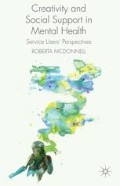Abstract
The transition from suffering to ‘now I have a life’ is a poignant one that should be taken seriously by anyone involved in planning mental health support services. When Greta says she has a job in the centre, she is referring to an idea that many of the day centre clients expressed directly or indirectly, which was that they had a sense of daily purpose, activity that benefitted not only themselves but the other clients. A common purpose was felt in the daily ritual of shopping for and cooking the lunch, in supporting fellow clients who were upset or distressed, in setting up for the art class and in keeping the environment tidy, organised and stocked. Dismaying, though, is Greta’s sense that she would like to be able to do the things she used to be good at. Unclear as to the reasons for this perceived inability, it is possible that side effects from medication are at least partly responsible for such reductions in motivation and self-confidence .Yet a demoralising effect may also be at work, in light of possible perceived stigmatising and excluding attitudes and experiences in the community and in society at large (as discussed in the previous chapters of this book). In the centre and perhaps too within the local community, a music programme similar to the art class might have helped Greta reignite her interest in and enjoyment of her musical capacities.
My life now, it’s okay, it’s better than when I was young, when I first got sick. But it could be better again, but I mean at the same time it could be worse. I’m happy enough at times with the family ‘round me and that, and coming in here. I’d love to be able to be normal and not be bothered in the way that I am with the voices and the annoyance… Indecision is a problem for me. I’m bored and agitated in the house, I don’t know what to do with myself… I thought of taking a job, but I have a job in here, I’ve jobs to do [in here] and I can talk with my friends… You get advice when you need it, you can talk about things and you get help with your problems… When I was young it used to come on me as an awful fear, like a sack of meal on my shoulders dragging me down… I prayed to God for help and [the community nurse] came out to me and I started coming here… And then I have my friend Rachel here too, I can talk to her about things. Now since coming here I have a life, I can enjoy the house a bit more when I get home, except for missing my mother, but now I have more time to myself too… treatment is good… but I’d just love to be able to live a normal life and to do the things I used to be good at, like the music.
Greta, Galway (2003)
Access this chapter
Tax calculation will be finalised at checkout
Purchases are for personal use only
Preview
Unable to display preview. Download preview PDF.
Copyright information
© 2014 Roberta McDonnell
About this chapter
Cite this chapter
McDonnell, R. (2014). Evaluation through Recovery Narratives. In: Creativity and Social Support in Mental Health. Palgrave Macmillan, London. https://doi.org/10.1057/9781137345486_5
Download citation
DOI: https://doi.org/10.1057/9781137345486_5
Publisher Name: Palgrave Macmillan, London
Print ISBN: 978-1-349-46651-1
Online ISBN: 978-1-137-34548-6
eBook Packages: Palgrave Social Sciences CollectionSocial Sciences (R0)

